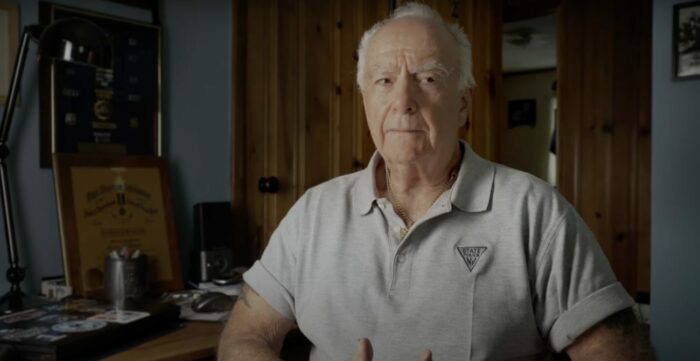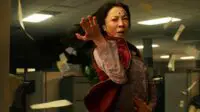Time moves forward, and nothing changes. Filmmaker Stefan Forbes opens the doors to a sizzling, moment in history which shouldn’t be so relevant, but is. Forty-three years ago, four African American males attempted to steal firearms from a local convenience store in Bushwick, Brooklyn. When the word was out that four black men have the store held hostage, cops swarmed the area with guns drawn. What proceeded was the longest standoff in New York City’s history, lasting a whopping 47 hours. What could have ended in a bloodbath miraculously didn’t. All thanks to the wise teaching of a man who deserves far more notoriety. Harvey Schlossberg is far from a household name despite saving countless lives throughout his career. Coined “the father of modern police psychology,” Schlossberg is responsible for modern hostage negotiation tactics utilized in Europe but rarely enough in the U.S.
Meticulously crafted, Hold Your Fire avoids the pretenses of prejudice. Every subject interviewed is a victim of a damaged culture. On the end of the robbers, two of the four bandits are interviewed, Shu’aib Raheem and Dawud Rahman. Shu’aib and Dawud are depicted as two guys who realize the error of their ways. Although holding up a sporting goods store with guns drawn, the men had no real intention of harming their hostage. Schlossberg called the robber’s bluff when they asked for a doctor and food. To Harvey’s observation, “if you’re worried about food, you don’t want to die.” Still, the repercussions for their actions had consequences. One of the hostages who happened to be in Al’s Shop, suffered from immeasurable trauma, never able to function again.

Why the men robbed the store was because as people of color during the 70s, they feared for their life. If the public didn’t mistreat them, then it would be the press. With so much fear and confusion, these boys didn’t know what to do. That didn’t matter to the police, who were fast to respond to the robbery, spitting disgustingly over the radio, “n*****s with guns.” Shortly after the racist transcript from the radio is read aloud to the audience, by two of the officers involved, one of the police chiefs claims in his interview that he knows “for a fact that cops aren’t racist.” Are you being serious?!

The parallels between the cops and burglars is astounding, not just in their difference in viewpoints, but the restraint in judgement the film shows between all parties. Mr. Forbes isn’t interested in telling a thriller about heroes or villains. Instead, he presents the world as is. A place where people get lost in the sea of life.
Although brimming with hatred, cops have no proper trauma management. Many officers in the film reveal that law enforcement officials have a substantial rate of suicide. The only form of therapy these men can find is at the bottom of a glass. I know from experience, if there’s one thing that helps fuel rage like nitric oxide, it’s alcohol. When the worst form of self-medication is legally available, combined with a society that embraces muscle over psychology, terrible results follow. During my interview with director Stefan Forbes at the Chicago Critics’s Film Festival, Mr. Forbes spoke about America’s obsession with masculinity over empathy And I couldn’t agree with him more.
America is a country driven by fear. Turn on your local, news station, and what do you see? It’s usually a story about a dangerous guy who killed someone. The mainstream media paints a boogeyman to fear. America culturally embraces dominance as a means to solve our problems. Why do we love action movies? Because we want to see bad guys get physically humiliated. When the Hulk throws Loki around like a child smashing a toy or when Batman does an extra double tap on a thug, audiences cheer with instant gratification. We don’t just want the bad guys to lose; we want them to be beaten to a pulp. Pushing things further, in the ’80s, we had macho men like Arnold Schwarzenegger ripping terrorists apart with his machine guns. And don’t get me wrong. I’m a Schwarzenegger fan. My dream would be to interview him after a few reps in the gym. To say that I’m not a product of toxic masculinity would be a fabrication.
In real life, there are no good guys or bad guys. Certainly in extreme circumstances, there certainly are distinct, unequivocal lines drawn. Yet, we never think of the humans involved in the local crimes we read about. When a “criminal” robs a store, we deem them “scum,” vermin to be locked away for life. In the eyes of the commoner, the four men who held up Al’s Sporting Goods are dirt to scrape off their boots, and the cops are bloodthirsty monsters with no soul. Both are stereotypes Hold Your Fire breaks apart with its masterful editing which must have been grueling to cut, which Mr. Forbes edited himself! That’s a lot of sleepless nights.
The timing between interview soundbites between subjects is razor sharp. There’s no fancy graphics with pictures of the event flying around the screen to showoff the editor’s Adobe After Effects skills. Merely quick cuts compiled with well timed sound effects creates a chilling atmosphere. To compliment the precise splicing is the score by Jonathon Sanford which perfectly blends with the imagery. Sanford’s notes play like an undercurrent of terror waiting to explode.
Despite robbing his store, Al felt sympathy for the folks who took his store hostage. To Al, they were just dumb kids who were confused. When hearing how many years in prison they faced, Al is genuinely devastated. The prison sentence the gunman faced was too severe. Mr. Dawud Rahman, in particular, was spent up to 48 years in prison.
Seeing Rahman’s soft-spoken demeanor and musical talent via the flute, makes him the exact opposite of the type of criminal you’d expect to see. He’s almost zen like when being interviewed within the prison walls he’s confined to. Mr. Forbes has a talent for trusting his subjects. As everyone bears their soul to the camera, the frame isn’t filmed via the usual rule of thirds angle, where the subject is to the left or right of the image. Instead they’re mostly shot in the center with the camera framed below eye level, as if the subject is confessing to the audience.
Hold Your Fire is a an excellent example of what a good documentary does; it presents an honest, emotional look at everyone involved and strives for an answer to its issue. Harvey Schlossberg’s proven hostage negotiation tactics need to be made aware to the public so we can thrive on being a more empathetic society. Hold Your Fire is available for rent on Amazon Prime




